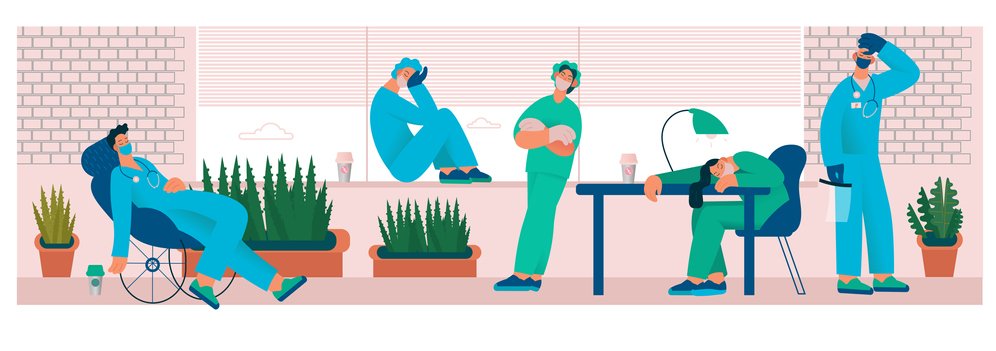
Nurses are feeling more burned out than ever before.
Nurses, are you feeling burned out?
The COVID-19 pandemic has stressed and continues to stress our entire world. Unsurprisingly, nurses are feeling the effects of the stressed healthcare system quite closely. Jennifer Taubert, the Worldwide Chairman of Pharmaceuticals for Johnson & Johnson and executive sponsor for Johnson & Johnson Nursing, weighed in on this issue.
She noted: “…Nurses are the care team members who spend the most time with patients. As a result, they may disproportionately experience changes in operating procedures and protocols, shortages of PPE, heavy workloads, extended shifts and fear of exposure to the virus.”
Nurses have to overcome daily obstacles as it is, and the pandemic added more pressure. Our nurses are feeling more burned out than ever.

3 Tips for dealing with burnout as a nurse
Dr. Sharon Chappy, Dean of the School of Nursing at Concordia, shares her thoughts on nursing burnout: “The past year has put a tremendous amount of strain on nurses. Uncertainty surrounding the pandemic, caring for patients affected by COVID-19, helping children with remote learning, staying connected with families during shutdowns, and above all taking measures to keep themselves and their families safe, have taken a toll on nurses’ mental health.”
Chappy offers a key tip for nurses who are currently feeling burned out.
Tip #1: Take care of yourself first
What does this look like, though?

Chappy says this: “Nurses who feel burned out need to recognize this is normal and accept the fact that they have to take care of themselves first. This could mean formal counselling, talking with friends, or making changes that help them to deal effectively and positively with the stresses they encounter.
“Nurses willingly give so much of themselves to others; but they must make their own well-being a priority,” Chappy states.
Tip #2: A change of scenery could help fight burnout
This tip is two-fold. First of all, when you’re feeling the effects of burnout, it can be nearly impossible to feel productive when you’re stuck in the same routine. The pandemic forced many of us to learn new, strict routines, especially in healthcare. Entrepreneur suggests changing your physical work location as an unconventional way to fight burnout.
This sounds great for anyone who’s not a nurse. If this isn’t possible for you, think about how you can change things up in your typical routine. A change of scenery for you could mean talking with your supervisor about what you’re experiencing and seeking different responsibilities.
If you’re in a good place to make a larger transition, you could consider a move to a new department or floor, or seek more education to help further your career. There are a variety of roles within nursing that would allow you to keep making a difference in a different capacity.
Consider becoming a nurse educator
Dr. Chappy shared her reasons why becoming a nurse educator could work for you.
- Positively influence the next generation of nurses
- Shape how students grow clinically and professionally to become caring and competent nurses
- Exponential impact: You get to influence all of the patients your students care for throughout their careers
Use healthcare informatics for evidence-based care
Dr. Chappy shares why she’s encouraging nurses to pivot toward informatics:
“We all talk about evidence-based nursing care. The pandemic has put an even greater spotlight on using evidence to make decisions and guide policies and practices.
Nurses are all familiar with electronic health records and other databases used in health care, but few nurses understand how to use the data we collect from patients to change and improve care.
In the Healthcare Informatics program, nurses learn to use data to make informed decisions that promote positive health outcomes for patients and to improve nursing practice overall.”

Tip #3: Give journaling a try.
Journaling? As a nurse? Why?
American Nurse Journal encourages nurses to journal. It’s very low-cost, and the benefits are clear. Journaling supports your overall health and wellness. This practice will let you write out how you feel, script-out your thoughts, and feel compassion toward yourself. Your self-awareness will grow over time, too. Writing in general is a good practice because it helps you feel more emotionally regulated, plus it supports cognition.
If you’re completely new to journaling, Nurses Inspire Nurses suggests these prompts to help you begin your process.
Final thoughts
Dr. Chappy’s initial advice should not be ignored. Prioritizing your mental and physical health needs to be top priority, especially during these unusual times. Taking care of yourself, changing your scenery when possible, and checking out journaling are a few healthy ways to meet your needs.
Do you want to know more about nursing degrees at Concordia?
You can talk to someone about what a Concordia University nursing degree could look like for you. Feel free to check out our School of Nursing page.
—
If this story has inspired you, why not explore how you can help further Concordia's mission through giving.